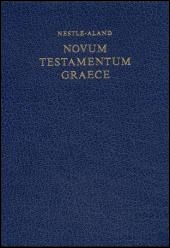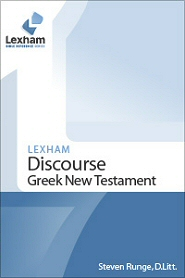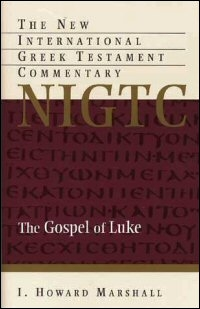
The Nestle-Aland 28th Edition Greek New Testament now incorporates the text-critical insights of the Editio Critical Maior (ECM) of the Greek New Testament into the text of Catholic Epistles, representing the most recent scholarly research in establishing the Greek text.
1 Καὶ εἰσελθὼν διήρχετο τὴν Ἰεριχώ.
2 Καὶ ἰδοὺ ἀνὴρ ὀνόματι °καλούμενος Ζακχαῖος, καὶ αὐτὸς ⸂ἦν ἀρχιτελώνης ⸄καὶ αὐτὸς⸅ πλούσιος⸃·
3 καὶ ἐζήτει ἰδεῖν τὸν Ἰησοῦν τίς ἐστιν καὶ οὐκ ἠδύνατο ἀπὸ τοῦ ὄχλου, ὅτι τῇ ἡλικίᾳ μικρὸς ἦν.
4 καὶ ⸀προδραμὼν ⸋εἰς τὸ⸌ ἔμπροσθεν ἀνέβη ἐπὶ συκομορέαν ἵνα ἴδῃ αὐτὸν ὅτι ἐκείνης ἤμελλεν διέρχεσθαι.
5 καὶ ⸂ὡς ἦλθεν ἐπὶ τὸν τόπον, ἀναβλέψας °ὁ Ἰησοῦς⸃ ⸆εἶπεν πρὸς αὐτόν· Ζακχαῖε, ⸀σπεύσας κατάβηθι, σήμερον γὰρ ἐν τῷ οἴκῳ σου δεῖ με μεῖναι
Aland, K., Aland, B., Karavidopoulos, J., Martini, C. M., & Metzger, B. M. (2012). Novum Testamentum Graece (28th Edition, Lk 19:1–5). Deutsche Bibelgesellschaft.

Our understanding of the Greek New Testament is based almost entirely on English translations, but how would our understanding of the Greek text change if we read it for what it is: as Greek? With The Lexham Discourse Greek New Testament, we can now get behind the words of the New Testament writers and discover the particular linguistic tasks that inform translation and interpretation.
| Καὶ | εἰσελθὼν | διήρχετο | Whom or What Spoken or Written About | τὴν | |||||||
| and | [he] entered | [and] traveled through | [-] |
| Ἰεριχώ | ||
| Jericho |
| 2 | Markers of | Transition | καὶ | Prompters of | Attention | ἰδοὺ | ἀνὴρ | ὀνόματι | ||||||||||||||
| and | behold | a man | by name |
| καλούμενος | Ζακχαῖος | |||
| called | Zacchaeus |
| καὶ | Whom or What Spoken or Written | About | αὐτὸς | ἦν | ἀρχιτελώνης | |||||||||||
| and | he | was | a chief tax collector |
| καὶ | Whom or What Spoken or Written About | αὐτὸς | πλούσιος | ||||||
| and | he [was] | rich |
| 3 | καὶ | ἐζήτει | ἰδεῖν | Whom or What | Spoken or Written About | τὸν | Ἰησοῦν | |||||||||||
| and | he was seeking | to see | [-] | Jesus |
| Whom or | What Spoken or Written About | τίς | ἐστιν | |||
| who | he was |
| καὶ | οὐκ | ἠδύνατο | ἀπὸ | Whom or | What Spoken or Written About | τοῦ | |||||||
| and | [he was] not | able [to] | as a result of | the |
| ὄχλου | ὅτι | Whom or What | Spoken or Written About | τῇ | ἡλικίᾳ | μικρὸς | ἦν | ||||||||
| crowd | because | in | stature | short | he was |
| 4 | καὶ | προδραμὼν | εἰς | Whom or What Spoken or | Written About | τὸ | ἔμπροσθεν | |||||||||||
| and | [he] ran on | [-] | [-] | ahead |
| ἀνέβη | ἐπὶ | συκομορέαν | ||||
| [and] climbed up | into | a sycamore tree |
| ἵνα | ἴδῃ | Whom or What Spoken or | Written About | αὐτὸν | ||||||
| so that | he could see | him |
| ὅτι | ἐκείνης | ἤμελλεν | διέρχεσθαι | |||||||||||
| because | he | was going | to go through [that way] |
| 5 | καὶ | ὡς | ἦλθεν | ἐπὶ | Whom or What Spoken | or Written About | τὸν | τόπον | ||||||||||||||||
| and | when | he came | to | the | place |
| ἀναβλέψας | Whom or What Spoken or Written About | ὁ | Ἰησοῦς | εἶπεν | πρὸς | |||||
| looked up | [-] | Jesus | [and] said | to |
| Whom or What Spoken or | Written About | αὐτόν | ||
| him |
| Ζακχαῖε | σπεύσας | κατάβηθι | |||||||||||||||
| Zacchaeus | hastening | come down |
| σήμερον | γὰρ | ἐν | Whom or What Spoken or | Written About | τῷ | οἴκῳ | |||||||||||
| today | because | at | [-] | house |
| Receptor, Receptors | σου | δεῖ | Speaker | με | μεῖναι | |||
| your | it is necessary | [for] me | to stay |
Runge, S. E. (2008–2014). The Lexham Discourse Greek New Testament (Lk 19:1–5). Lexham Press.
Commentary

This commentary series is established on the presupposition that the theological character of the New Testament documents calls for exegesis that is sensitive to theological themes as well as to the details of the historical, linguistic, and textual context. Such thorough exegetical work lies at the heart of these volumes, which contain detailed verse-by-verse commentary…
vii. Zacchaeus the Tax-Collector 19:1–10
The final story in the long account of Jesus on his journey to Jerusalem is meant to be a climax in the ministry of Jesus, and it brings out several notable features which Luke considered important. It is a supreme example of the universality of the gospel offer to tax-collectors and sinners, with Jesus taking the initiative and inviting himself to the house of Zacchaeus. In doing so Jesus was certainly responding to the interest shown in him by Zacchaeus, but the decisive action, contrary to all that would be expected at the time, stemmed from Jesus.
Zacchaeus for his part responds with joy, and also by promising to use his wealth, honestly and ill-gotten, to help the poor and to make restitution for his former evil habits; in this way the meaning of discipleship, especially in regard to wealth, is clearly expressed. Jesus affirms that, tax-collector though he is, Zacchaeus is entitled to salvation, for he too is a Jew, a member of the people to whom salvation was promised by God in the coming of the Messiah. But salvation comes even to Jews only when Jesus goes after them and brings them home.
So the narrative concludes with the great declaration of the task of the Son of man as a shepherd, which may fittingly be regarded as the epitome of the message of this Gospel. In form the story is what Dibelius, 115, calls a ‘personal legend’, full of anecdotal detail which is essential to the narrative; he contrasts it with the preceding story of the blind man which is much more a ‘typical’ healing story, and he rightly regards it as having a historical core (293). He thus implicitly refutes the claim of Bultmann, 33f., that it is an ideal scene.
Essentially the story is a unified composition. Bultmann, 33f., 58f., 65, is disposed to regard vs. 8 and 10 as Lucan additions. (cf. Grundmann, 358). The difficulty with v. 8 is that it breaks the connection between v. 7 (where the bystanders grumble) and v. 9 (which, despite the πρὸς αὐτόν, appears to be addressed to them, since it refers to Zacchaeus in the third person); moreover, v. 9 makes no allusion to the proposal of Zacchaeus in v. 8.
There is certainly an inconcinnity in the narrative here, but the material has been so thoroughly edited by Luke and his source that it is hard to offer a certain analysis. If the thought of v. 8 was congenial to Luke, the same is also true of vs. 9 and 10, so that a decision on grounds of content is scarcely possible; cf. the detailed analysis by Dupont, II, 249–254. There are some grounds for regarding the legal details in v. 8 as forming an integral part of the story (Derrett, 278–285), and there are also sound reasons for regarding v. 10 as a saying of Jesus, although possibly a misplaced one.
It seems probable that v. 10 is an isolated saying, and that we should regard v. 9 as addressed to Zacchaeus and the bystanders simultaneously; it has possibly been reformulated by Luke in order to give a comment on the story for the benefit of the readers, and to give a link to v. 10. The story is from Luke’s special source, and probably stood in juxtaposition with the parable of the Pharisee and the tax-collector with a catchword connection. Bultmann’s view that it is a developed variant of the simpler story in Mk. 2:14–17 is pure speculation; the preservation of the name Zacchaeus speaks in favour of its historicity.
(1) The opening verse links with the preceding story of the blind man which was located outside Jericho. διέρχομαι may be Lucan (19:4; 2:15; et al.). It is difficult to know whether the detail originally belonged to the story of Zacchaeus or is a redactional addition. Schramm, 143f., argues that 18:35a contains the original introduction to the story, and that Luke created 19:1 to replace it when he repositioned the original introduction before the story of the blind man.
It is true that the story of the blind man is associated with Jericho in Luke’s source (Mk. 10:46), and the story of Zacchaeus could have been secondarily placed in the same location. But the fact that Jericho was a likely post for a tax-collector means that the Zacchaeus story could well belong to this locality also. It has further been claimed that Zacchaeus would not have climbed a tree within Jericho but rather a roof (Wellhausen, 103), but Lagrange, 488 (cf. Bultmann, 69), has indicated that trees still grow in Herodian Jericho, which was spaciously laid out.
(2) The action is introduced, as often, with καὶ ἰδού (cf. 5:12; et al.). The combination of ὀνόματι (1:5; et al.) and καλούμενος (1:36; et al.) is odd and unique. Perhaps it is meant to draw especial attention to the man’s name, Ζακχαῖος, Hebrew zaḵḵay, an abbreviation of ‘Zachariah’, meaning ‘the righteous one’ (2 Mac. 10:19; Jos., Vit. 239); Zacchaeus thus has a thoroughly Jewish name. ἀρχιτελώνης**, ‘chief tax-collector’, is found only in this passage, and implies that Zacchaeus was probably head of a group of tax-collectors who were responsible for customs dues in the area on goods passing from Peraea into Judaea (cf. O. Michel, TDNT VIII, 97–99).
From the fact that Zacchaeus was rich (6:24; et al.) we are already entitled to assume that, like others of his trade, he was none too scrupulous in making sure that he got a good profit on his transactions. More important is the allusion to the earlier question whether a rich man can be saved (Danker, 191).
(3) We are not told why Zacchaeus made an effort (ζητέω, cf. 9:9; 23:8) to see who Jesus was (cf. 4:34 par. Mk. 1:24 for this construction); curiosity is presumably the motif. The reader at least knows that Jesus has a reputation as the friend of tax-collectors, and Zacchaeus may be presumed to be in the same position. But he was unable to see Jesus because of the crowd: ἀπό is commonly used in this sense (Acts 11:19; 22:11; Mt. 18:7; et al.; AG s.v. V). ἡλικία (2:52) here obviously means ‘height’; Danker’s allusion (191) to 12:25 is fanciful. Clearly it is Zacchaeus and not Jesus who is small in height, despite the doubts expressed by Findlay, 1052.
(4) In order to gain a glimpse of Jesus, Zacchaeus runs on ahead (προτρέχω, Jn. 20:4**) in front of the crowd which is surrounding Jesus. εἰς τὸ ἔμπροσθεν is pleonastic (cf. Tob. 11:3 B; BD 484), and Black, 116, suggests that it equals Aramaic leqaḏhmutheh, ‘to meet him’, but Zacchaeus’ action in climbing a tree hardly supports this. συκομορέα** (17:6 note) is the ‘fig-mulberry’ or ‘sycamore fig’ (Ficus sycomorus L; C.-H. Hunzinger, TDNT VII, 758f.), a tree rather like an oak and easy to climb; it had evergreen leaves and bore an edible fruit, and should not be confused with the European sycamore or the North American plane (F. N. Hepper, NBD, 1294). With ἐκείνης sc. ὁδοῦ (cf. 5:19). The preposition διʼ is prefixed in Θ Ψ f1 69 pm a l s; Diglot.
(5) Whether Zacchaeus intended to remain hidden from view or not is not stated, but it may be assumed that this was his intention, since it would hardly be consistent with his dignity to be found up a tree. But in any case, Jesus knew that he was there and knew his name (cf. Nathanael, Jn. 1:47f.); this may be a case of supernatural knowledge, but it is perfectly possible that Jesus could have known his name. After Ἰησοῦς the words εἶδεν αὐτὸν καί are added by A (D) W Γ Δ f13 pl; TR; Diglot, but they seem redundant after ἀναβλέψας.
Zacchaeus is told to waste no time (σπεύδω, 2:16; et al.) in coming down, for today Jesus must stay in his house. σήμερον is to be taken quite literally, but it may convey the idea that the time has come for the fulfilment of God’s plan of salvation (19:9; cf. 2:11; et al.; Ellis, 221). Behind Jesus’ summons lies a necessity imposed on him by God (δεῖ); the implication is that a divine plan is being worked out. μένω is the usual word for staying at a person’s house (Jn. 1:38f.), equivalent here to καταλύω, ‘to stay a night’ (19:7).
Marshall, I. H. (1978). The Gospel of Luke: a commentary on the Greek text (pp. 694–697). Paternoster Press.